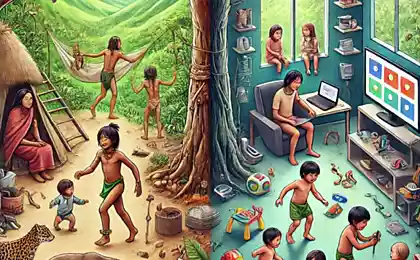515
Deepak Chopra: the needs of the child in different periods of life
Baby, 1 year
KEYWORDS: love, tenderness, attention.
Fortunately for our generation, in our day have refused the false notion that children need to educate and teach discipline from the cradle. Baby — the pure gold of spiritual understanding. Cherishing his innocence, we can find a way back to themselves. So on the right track those parents who are disciples of their child. Touching your child, taking him in his arms, protecting it from all dangers, playing with him and giving him their attention, you establish a spiritual connection. Without these "primitive" reactions that surrounds it, the human body can not luxuriantly flourish — it will wither and lose power just as a flower deprived of sunlight.
The toddler, 1-2 years
KEY WORDS: freedom, encouragement, respect.
At this stage of its development, the child first becomes ego. Here the word ego is used in its simplest sense, as "I", as a recognition of "I am". This is a dangerous time, because a child first experiences a separation from their parents. The temptation of freedom and curiosity pushing in the same direction, but fear and uncertainty pull in the other. Not all the experiences associated with the fact that you're on your own, nice. Therefore, at this time, parents should teach a spiritual lesson without which no child can truly become an independent personality: the world is safe.
Ninety nine million two hundred sixty two thousand seven hundred sixty nine
If you, as an adult, feel safe, this means that when you are under one to two years, you were not due to fear: instead, parents encouraged your limitless development, taught to value freedom despite injuries that a child gets from time to time, colliding with the surrounding things of this world. Fall is not one and the same as to fail, to feel pain is not one and the same as to decide that the world is dangerous. Trauma — not that other, as a tool that Nature uses to tell the child where the border; pain exists to show a young child where it begins and ends with "I" to help him avoid potential hazards like burns or falling down the stairs.
When parents distort this natural process of learning, the result is a feeling of psychological pain that is not the intention of Nature. Physiological pain sets the boundaries that you cannot cross without experiencing deep anxiety about his condition. If the child associates the injury with the fact that he's a bad, weak that he is not able to cope with difficulties, or that he is surrounded by dangers, a place for inner spiritual growth. Without a sense of security unattainable spirit: man is always trying to just feel confident in this world, but this confidence can never be achieved until he gets rid of the fingerprints obtained in early childhood.
Preschool, 2 -5 years
KEY WORDS: commendable, exploring, welcome.
At this stage the child develops a sense of self-esteem. Self-esteem is ready to leave the family to meet with the great world. This is the period of assignments and tests. Until the child turns two or three years, he is not responsible for the tasks set before it the task — it is enough to play and be cheerful. At this time the only spiritual duty is to give food to the delight that is experiencing "I", when it opens a new world. While studying, neatness and the ability to hold a spoon, the child begins to realize that "I am" can extend to "I can." When ego two-year-old man realized this, nothing can stop. It thinks he owns the whole world — and, of course, all the members of his family.
"I" at this time, like just turned on the generator power, and that is especially terrible, newborn ego uses this power the most unorganized way. Screaming, screeching, prevarication, using the all-powerful word! and all attempts to control reality by means of only one of his desire is exactly what should happen in this age.
In a spiritual sense the value of this preschool is that this power is spiritual power, and only the distortion it leads to problems. So instead of trying to hold back the tides of energy in your children, guide them on such tasks and tests, which teach the acquisition of balance. In the absence of equilibrium uncontrollable desire preschooler to show their strength leads to grief, because what he is experiencing, for the most part the illusion of power. Incessantly chattering two-year-old is still tiny, vulnerable, immature character. His love for children we accept the illusion because we want them to grow into strong, intelligent people, ready for any test. But such a sense of self-esteem cannot develop in a child if at this age to stop or suppress the feeling that he has the power.
Age kindergarten — first grades of elementary school 5-8 years
KEY WORDS: donation, skill sharing, non-judgment, acceptance, sincerity.
Key words that apply to the first school years are of a more social connotation. Of course, there are many other words, because when the child is five years of age, understands the world, his brain is so complex and active, that he acquires and validates an infinite number of concepts. In addition, I do not want to say that the education skills to share, to give what you have, and another to speak the truth can be neglected in the earlier years, but the critical moment of this age is that at this time the child begins to learn abstract concepts. Specifically, the thinking mind of a baby that didn't understand the reasons for your behavior, but only felt, now acquires the ability to perceive reality beyond the "I am", "I want" and "me first".
The way we give, in any age, shows how we empathize with the needs of those around us. If giving, we see this as a loss — I have something to give you to be able to have it — hence, the spiritual lesson at this stage was not passed. Giving in the spiritual sense means: "I give you, with nothing to lose, because you're part of me". A small child may not fully grasp this idea, but it can feel. Children do not just want to share — they love to share. They feel the heat which is released when the intersection of the boundaries of the ego and the inclusion into the world of another person — there is no greater evidence of proximity, and therefore no other action will not cause such bliss.
The same can be said about truthfulness. We lie in order to protect himself, to prevent the danger of punishment. Fear of punishment implies inner tension, and, even if lie does protect from a perceived danger, it rarely if ever helps to get rid of this internal tension. To do this can only be true. When a young child is taught that if he is telling the truth, it gives them a pleasant feeling, he makes the first step to the realization that truth has a spiritual value.
Do not have to resort to punishment. If you educate the child attitude "tell the truth or there will be trouble", you teach spiritual hypocrisy. The child who is tempted to lie is under the influence of fear. If consciousness comes really related to this fear, the mind logically tries to act in the best way by telling the truth. In any case, you are forcing the child to do better than you think it really is. To teach students to act on the basis of the demands of others — a sure recipe for spiritual destruction. Your child must feel: "this is what I want to do."
Older children, 8 -1 2 years
KEY WORDS: independence of judgment, intelligibility, insight into the nature.
Many parents this stage of child development brings the greatest joy, because by this time children develop their personality and independence. They begin to think differently, they have Hobbies, likes and dislikes, enthusiasm, reinforced the desire to open that can stay for life, such as love of science or art. Applicable to this age the key spiritual concepts fully correspond to this exciting phase.
Although it sounds dry, "intelligibility" — the excellent quality of the soul. It is much more than just to distinguish the good from the bad. During these years, the nervous system is able to maintain a keen sense of the greatest depth and importance of the future. Ten-year-old child was capable of wisdom, and, above all, we are talking about the most delicate gift of personal insight into the nature of things. The child is able to see with their own eyes, and judge on the basis of what he sees: he no longer receives the world is second hand — from the hands of adults.
So this is the first stage, when the concept of the "spiritual law" can be understood by the mind. Law seems like the rule to follow or at least pay attention. Instead of using the word law, parents can use the words "how it works", or "why things happen that way", or "do it so that you felt that it was good". This is a more specific way of learning, based on experience.
However, at the age of ten or so abstract reasoning take independent turnover, and a real teacher is the authoritative person now becomes an experience. Why this happens is a spiritual mystery, because the experience was present from birth, but for some reason the world suddenly started talking with a child: it comes from within a deep understanding of why it is correct or not, why so many mean truth and love.
The early teenage years, 12 -15 years
KEY WORDS: self-awareness, experimentation, responsibility.
Childhood ends and adolescence begins, the time is considered to be difficult. The childlike innocence suddenly turns sexual maturity, and the young creatures appear needs that parents can no longer satisfy. Parents begin to understand that the time has come to let go of their children and believe that they are able to deal with a world of responsibility and pressure, to which, maybe, the parents just learned to adapt by getting rid of feelings of uncertainty.
Decisive now is that the childhood lessons are starting to bear fruit —sweet or bitter. A child who is sent into the world with the fingerprints of genuine spiritual knowledge and will reflect the pride and confidence of their parents. Child who is moving his feet and in complete disarray, desperately experimenting and constantly experiencing pressure from their peers, likely reflects a hidden disorder of his upbringing.
Adolescence is a time of notorious shyness, but it can also be a time of self-realization.
When childhood ends, experimentation naturally, but it should not be reckless and destructive. The question is whether the child's inner self that you can use as a guide. This inner self is quiet a voice that has the power to choose between right and wrong, based on a deep understanding of life. Age for this understanding doesn't matter. A newborn infant possesses them to the same extent as a Mature adult. The difference is that a grown man follows a behavior, which is determined by the internal guide, and if you have taught your child to listen to their own silence you without fear, you can let him go into the world not as a child. This is a very joyful experience (although at times and getting nervous) to see the result of experimentation with the variety of choices offered to the growing child's life, it increases self-awareness.
Deepak Chopra "the Seven Spiritual Laws for parents" published
P. S. And remember, just changing your mind - together we change the world! ©
Source: www.stranamam.ru/post/9712376/
KEYWORDS: love, tenderness, attention.
Fortunately for our generation, in our day have refused the false notion that children need to educate and teach discipline from the cradle. Baby — the pure gold of spiritual understanding. Cherishing his innocence, we can find a way back to themselves. So on the right track those parents who are disciples of their child. Touching your child, taking him in his arms, protecting it from all dangers, playing with him and giving him their attention, you establish a spiritual connection. Without these "primitive" reactions that surrounds it, the human body can not luxuriantly flourish — it will wither and lose power just as a flower deprived of sunlight.
The toddler, 1-2 years
KEY WORDS: freedom, encouragement, respect.
At this stage of its development, the child first becomes ego. Here the word ego is used in its simplest sense, as "I", as a recognition of "I am". This is a dangerous time, because a child first experiences a separation from their parents. The temptation of freedom and curiosity pushing in the same direction, but fear and uncertainty pull in the other. Not all the experiences associated with the fact that you're on your own, nice. Therefore, at this time, parents should teach a spiritual lesson without which no child can truly become an independent personality: the world is safe.
Ninety nine million two hundred sixty two thousand seven hundred sixty nine
If you, as an adult, feel safe, this means that when you are under one to two years, you were not due to fear: instead, parents encouraged your limitless development, taught to value freedom despite injuries that a child gets from time to time, colliding with the surrounding things of this world. Fall is not one and the same as to fail, to feel pain is not one and the same as to decide that the world is dangerous. Trauma — not that other, as a tool that Nature uses to tell the child where the border; pain exists to show a young child where it begins and ends with "I" to help him avoid potential hazards like burns or falling down the stairs.
When parents distort this natural process of learning, the result is a feeling of psychological pain that is not the intention of Nature. Physiological pain sets the boundaries that you cannot cross without experiencing deep anxiety about his condition. If the child associates the injury with the fact that he's a bad, weak that he is not able to cope with difficulties, or that he is surrounded by dangers, a place for inner spiritual growth. Without a sense of security unattainable spirit: man is always trying to just feel confident in this world, but this confidence can never be achieved until he gets rid of the fingerprints obtained in early childhood.
Preschool, 2 -5 years
KEY WORDS: commendable, exploring, welcome.
At this stage the child develops a sense of self-esteem. Self-esteem is ready to leave the family to meet with the great world. This is the period of assignments and tests. Until the child turns two or three years, he is not responsible for the tasks set before it the task — it is enough to play and be cheerful. At this time the only spiritual duty is to give food to the delight that is experiencing "I", when it opens a new world. While studying, neatness and the ability to hold a spoon, the child begins to realize that "I am" can extend to "I can." When ego two-year-old man realized this, nothing can stop. It thinks he owns the whole world — and, of course, all the members of his family.
"I" at this time, like just turned on the generator power, and that is especially terrible, newborn ego uses this power the most unorganized way. Screaming, screeching, prevarication, using the all-powerful word! and all attempts to control reality by means of only one of his desire is exactly what should happen in this age.
In a spiritual sense the value of this preschool is that this power is spiritual power, and only the distortion it leads to problems. So instead of trying to hold back the tides of energy in your children, guide them on such tasks and tests, which teach the acquisition of balance. In the absence of equilibrium uncontrollable desire preschooler to show their strength leads to grief, because what he is experiencing, for the most part the illusion of power. Incessantly chattering two-year-old is still tiny, vulnerable, immature character. His love for children we accept the illusion because we want them to grow into strong, intelligent people, ready for any test. But such a sense of self-esteem cannot develop in a child if at this age to stop or suppress the feeling that he has the power.
Age kindergarten — first grades of elementary school 5-8 years
KEY WORDS: donation, skill sharing, non-judgment, acceptance, sincerity.
Key words that apply to the first school years are of a more social connotation. Of course, there are many other words, because when the child is five years of age, understands the world, his brain is so complex and active, that he acquires and validates an infinite number of concepts. In addition, I do not want to say that the education skills to share, to give what you have, and another to speak the truth can be neglected in the earlier years, but the critical moment of this age is that at this time the child begins to learn abstract concepts. Specifically, the thinking mind of a baby that didn't understand the reasons for your behavior, but only felt, now acquires the ability to perceive reality beyond the "I am", "I want" and "me first".
The way we give, in any age, shows how we empathize with the needs of those around us. If giving, we see this as a loss — I have something to give you to be able to have it — hence, the spiritual lesson at this stage was not passed. Giving in the spiritual sense means: "I give you, with nothing to lose, because you're part of me". A small child may not fully grasp this idea, but it can feel. Children do not just want to share — they love to share. They feel the heat which is released when the intersection of the boundaries of the ego and the inclusion into the world of another person — there is no greater evidence of proximity, and therefore no other action will not cause such bliss.
The same can be said about truthfulness. We lie in order to protect himself, to prevent the danger of punishment. Fear of punishment implies inner tension, and, even if lie does protect from a perceived danger, it rarely if ever helps to get rid of this internal tension. To do this can only be true. When a young child is taught that if he is telling the truth, it gives them a pleasant feeling, he makes the first step to the realization that truth has a spiritual value.
Do not have to resort to punishment. If you educate the child attitude "tell the truth or there will be trouble", you teach spiritual hypocrisy. The child who is tempted to lie is under the influence of fear. If consciousness comes really related to this fear, the mind logically tries to act in the best way by telling the truth. In any case, you are forcing the child to do better than you think it really is. To teach students to act on the basis of the demands of others — a sure recipe for spiritual destruction. Your child must feel: "this is what I want to do."
Older children, 8 -1 2 years
KEY WORDS: independence of judgment, intelligibility, insight into the nature.
Many parents this stage of child development brings the greatest joy, because by this time children develop their personality and independence. They begin to think differently, they have Hobbies, likes and dislikes, enthusiasm, reinforced the desire to open that can stay for life, such as love of science or art. Applicable to this age the key spiritual concepts fully correspond to this exciting phase.
Although it sounds dry, "intelligibility" — the excellent quality of the soul. It is much more than just to distinguish the good from the bad. During these years, the nervous system is able to maintain a keen sense of the greatest depth and importance of the future. Ten-year-old child was capable of wisdom, and, above all, we are talking about the most delicate gift of personal insight into the nature of things. The child is able to see with their own eyes, and judge on the basis of what he sees: he no longer receives the world is second hand — from the hands of adults.
So this is the first stage, when the concept of the "spiritual law" can be understood by the mind. Law seems like the rule to follow or at least pay attention. Instead of using the word law, parents can use the words "how it works", or "why things happen that way", or "do it so that you felt that it was good". This is a more specific way of learning, based on experience.
However, at the age of ten or so abstract reasoning take independent turnover, and a real teacher is the authoritative person now becomes an experience. Why this happens is a spiritual mystery, because the experience was present from birth, but for some reason the world suddenly started talking with a child: it comes from within a deep understanding of why it is correct or not, why so many mean truth and love.
The early teenage years, 12 -15 years
KEY WORDS: self-awareness, experimentation, responsibility.
Childhood ends and adolescence begins, the time is considered to be difficult. The childlike innocence suddenly turns sexual maturity, and the young creatures appear needs that parents can no longer satisfy. Parents begin to understand that the time has come to let go of their children and believe that they are able to deal with a world of responsibility and pressure, to which, maybe, the parents just learned to adapt by getting rid of feelings of uncertainty.
Decisive now is that the childhood lessons are starting to bear fruit —sweet or bitter. A child who is sent into the world with the fingerprints of genuine spiritual knowledge and will reflect the pride and confidence of their parents. Child who is moving his feet and in complete disarray, desperately experimenting and constantly experiencing pressure from their peers, likely reflects a hidden disorder of his upbringing.
Adolescence is a time of notorious shyness, but it can also be a time of self-realization.
When childhood ends, experimentation naturally, but it should not be reckless and destructive. The question is whether the child's inner self that you can use as a guide. This inner self is quiet a voice that has the power to choose between right and wrong, based on a deep understanding of life. Age for this understanding doesn't matter. A newborn infant possesses them to the same extent as a Mature adult. The difference is that a grown man follows a behavior, which is determined by the internal guide, and if you have taught your child to listen to their own silence you without fear, you can let him go into the world not as a child. This is a very joyful experience (although at times and getting nervous) to see the result of experimentation with the variety of choices offered to the growing child's life, it increases self-awareness.
Deepak Chopra "the Seven Spiritual Laws for parents" published
P. S. And remember, just changing your mind - together we change the world! ©
Source: www.stranamam.ru/post/9712376/
33 sites that will make you a genius
The subtle difference between champagne, semi-sparkling and sparkling wine























